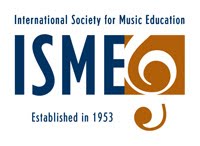The isme community mourns the death of Prof Bennett Reimer. Prof Reimer was highly regarded across the globe as a scholar and music educator who was an exemplary advocate for music education. He will be remembered for his enormous contribution to the development of the philosophy of music education, his vision for the centrality of music to education, and his generous mentorship of colleagues.
Thursday, 21 November 2013
Bennett Reimer (1932-2013)
In Memory of Bennett Reimer
Wednesday, 20 November 2013
Translation help/ Bonn Declaration
available in French
<http://www.emc-imc.org/fileadmin/user_upload/Cultural_Policy/Bonn_Declarati
on_FR.pdf> .
The Bonn Declaration examines how the UNESCO Seoul Agenda, Goals for the
Development of Arts Education
<http://www.unesco.org/new/fileadmin/MULTIMEDIA/HQ/CLT/CLT/pdf/Seoul_Agenda_
EN.pdf> can be applied to the field of music in Europe. It reflects common
focal points for the development of music education in Europe. It
acknowledges the principle of subsidiarity and calls upon political decision
makers at local, regional, national and European level to define common
policies that promote the development of music education in Europe at all
levels and to put these policies into practice. On the other hand, it is
directed at music education institutions and music education practitioners
themselves, offering them a matrix for self-reflection, reviewing the goals
and checking whether they are applicable.
We would also like to turn to you with a request to help in translating the
Declaration to your own language. In doing so, you would greatly help the
EMC in further disseminating the Bonn Declaration throughout Europe.
If you are able to help, please get in touch with us to coordinate
translations and we will be happy to assist you in every possible way.
Thank you in advance and best regards,
The EMC Team
--
European Music Council
Weberstr. 59a
D-53113 Bonn, Germany
Tel: +49 228 96 69 96 64
Fax: +49 228 96 69 96 65
Website:www.emc-imc.org
The EMC on Facebook. Follow us here
<http://www.facebook.com/pages/European-Music-Council/170280346325902> .
The EMC on Twitter. Follow us here <https://twitter.com/EMC_IMC> .
The EMC is the regional group for Europe of the International Music Council
(IMC) <http://www.imc-cim.org> ; it is a member of Culture Action Europe
<http://www.cultureactioneurope.org> .
The European Music Council is supported by the European Union (Culture
Programme), the Federal Government Commissioner for Culture and the Media of
Germany and the City of Bonn.
Monday, 18 November 2013
ISME Sistema SIG News Update #17
Thursday, 14 November 2013
2 new fantastic videos about #isme2014
Sunday, 10 November 2013
Interview with Dr. Eckart Altenmüller, keynote speaker #isme2014
Monday, 4 November 2013
The launch event of the 31st ISME World Conference in São Paulo - Brazil
In October was held in São Paulo the launch event of the 31st ISME World Conference - ISME Brazil 2014. The launch event of the conference brought together the Secretary of State for Culture , Marcelo Mattos Araujo , director of the British Council in São Paulo, Eric Klug , Liane Hentschke , coordinator of ISME 2014, and Katherine Zeserson , director of learning and participation of the Sage Gateshead , greater NGO young music world. Zeserson will also be a keynote speaker of the ISME 2014.
At the time the ISME partners invited Social Organizations linked to the Secretariat and music education programs , as well as other institutions linked to music education , to participate in the event which will be held in Porto Alegre , in July 2014. This is the first time that the Conference will be held in a Latin American country. From the event will be signed a collaboration between parties to the Conference also get an arm in São Paulo.
The Coral Project Guri closed the event alongside teachers Sage Gateshead, on that occasion developed activities with students of the poles of capital, through a partnership with the Ministry of Culture and the Santa Marcelina Culture, social organization that manages the poles of the project in the capital and the metropolitan area. The Coral Guri will also perform the opening event of the 31th Conference of ISME, in Porto Alegre.




